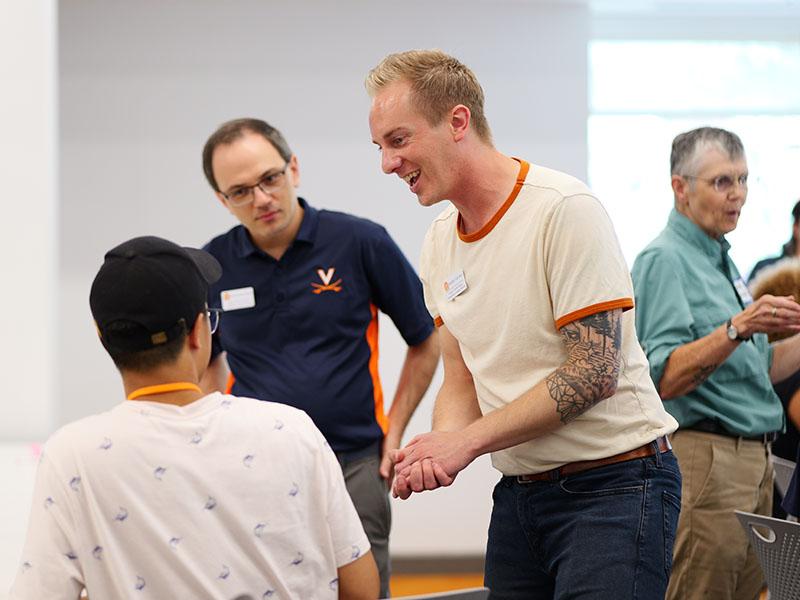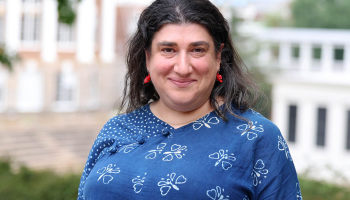Arts & Sciences Sees Major Gains in Student Satisfaction Following Advising Overhaul

A year into a sweeping transformation of its pre-major advising program, the University of Virginia’s College of Arts & Sciences is seeing significant improvements in student satisfaction and advisor engagement, according to a new assessment report released in June.
A “Pre-Major Advising Assessment Report,” based on a survey of nearly 1,900 first-year students, shows that 84% of respondents were satisfied with their advising experience — a dramatic increase from just 55% among first-year students in 2024 and 64% overall in 2022. Among students assigned to the College’s new Advising Fellows, satisfaction rose even higher, to 89%.
The results mark a milestone in the College’s multi-year effort to reimagine undergraduate advising as a core part of the academic experience. The initiative, launched in 2024, integrates advising into the classroom through the Engagements curriculum and invests in full-time Advising Fellows who serve as students’ primary guides through their first academic year.
“This is transformational work,” said Christa Acampora, Buckner W. Clay Professor of Philosophy and dean of the College and Graduate School of Arts & Sciences. “We’ve created a model that greatly improves access to knowledgeable and dedicated advisors, strengthening the student experience and trajectory from the very beginning. Students are now building meaningful relationships with advisors who understand their goals and can help them navigate their academic journey with confidence.”
Previously, students were assigned to faculty advisors who, while dedicated educators, often had limited access to formal advising training or structured support systems. As a result, advising experiences varied widely, with some students encountering challenges in finding consistent guidance or knowing where to turn for help.
The new model addresses those challenges directly. Advising Fellows — full-time professionals whose primary role is advising — now work closely with students in small cohorts, often through their first-year Engagements courses. Each Fellow advises about 70 students per year, allowing for more personalized and informed support.
“No other school is doing this at scale,” said Meira Kensky, advising director for Arts & Sciences. While many small liberal arts college are able to integrate advising into the curriculum, Arts & Sciences is the only large public institution implementing such a model for all its undergraduates, with full curricular integration and a team of scholar-advisors with deep liberal arts expertise.”
“We’ve built a system where advising is not separate from teaching — it is teaching. And we’re seeing the results in how students are engaging with their education and planning their futures.”
The June report spearheaded by Senior Undergraduate Curriculum & Enrollment Manager Brian Paljug and the College’s Advising Steering Committee, also highlights strong outcomes for the advisors themselves. Faculty and Advising Fellows reported high levels of satisfaction with their training and resources, with 100% of respondents agreeing they believed they made a difference in their students’ lives. Advisors also expressed confidence in their ability to guide students through course selection, major exploration and university policies.
The College’s advising transformation was informed by extensive research, including student focus groups, faculty and staff input, and benchmarking against peer institutions. The resulting model emphasizes early and frequent advisor-student interaction, curricular integration and a community of practice among advisors.
In the 2025–26 academic year, the model will be fully implemented. All first-year students — except Echols Scholars and those studying abroad — will be advised by their Engagements instructor. Additionally, the Advising Fellows team has expanded to 26 members, who will advise two-thirds of the incoming class, with the remainder supported by trained faculty advisors.
The College will also provide students with a “Commonplace Book,” a resource that will guide them through advising-related activities each quarter, helping them reflect on their goals, explore majors and connect with campus resources.
As the program moves into its second year, its leaders feel the innovative model will continue to demonstrate positive impacts on A&S students, faculty and staff.
“We’re proud of the progress we’ve made, and we’re committed to continuing to improve,” Kensky said. “This work is about more than just course enrollment and tracking degree progress — it’s about helping students find their path, build confidence and thrive at UVA.”
We’re here to answer your questions! Contact us today.







